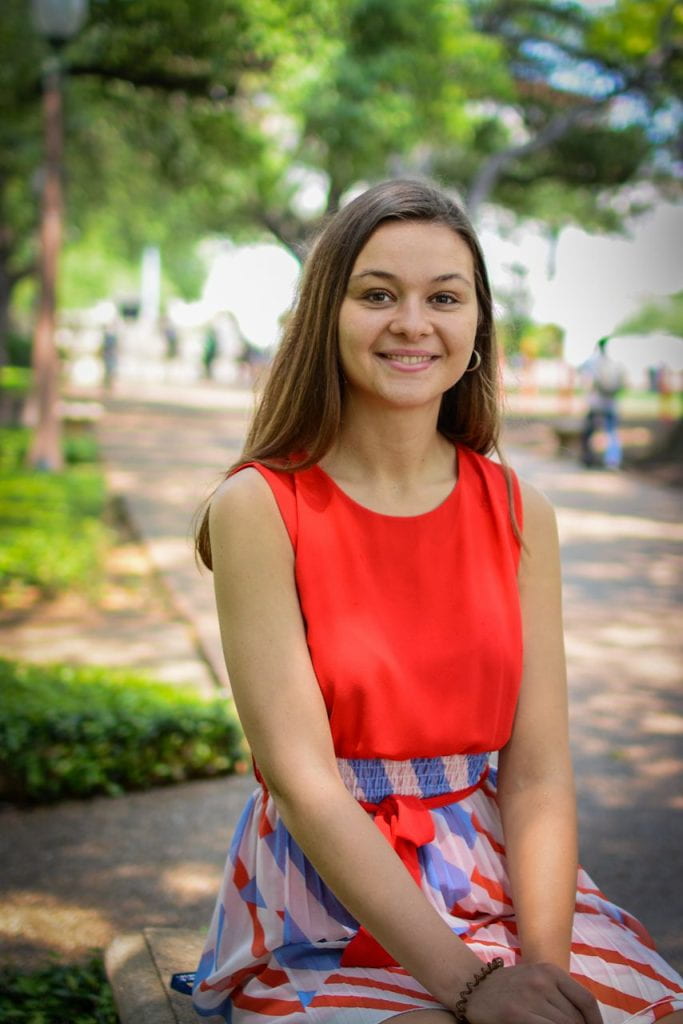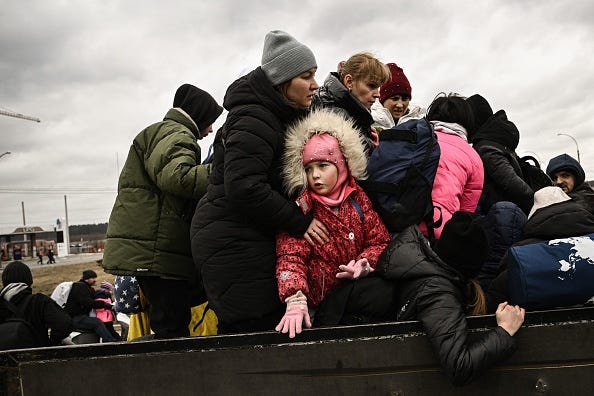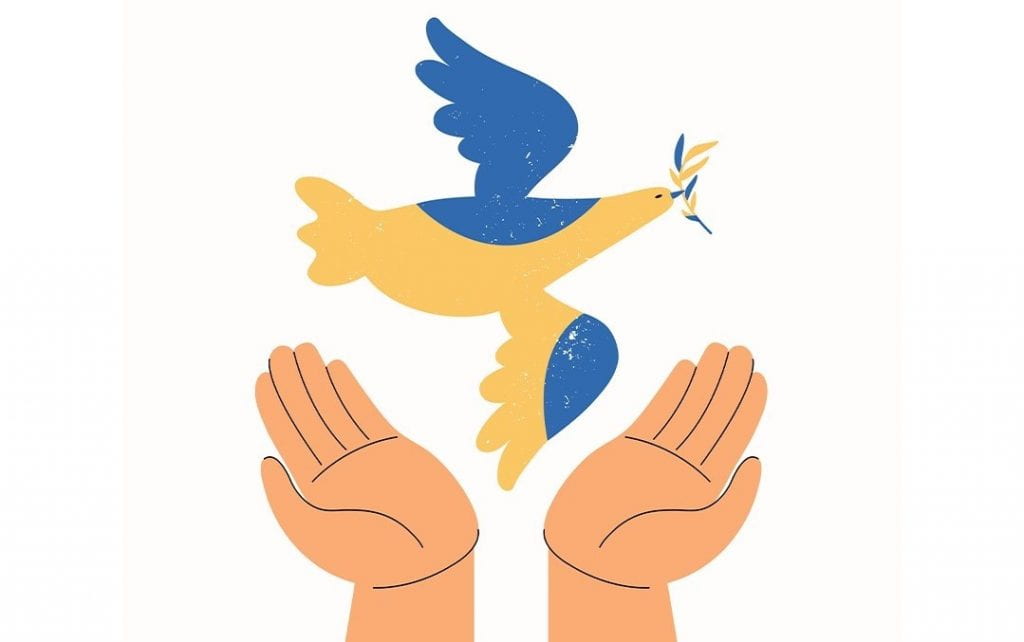A story behind documenting Russian crimes in Ukraine
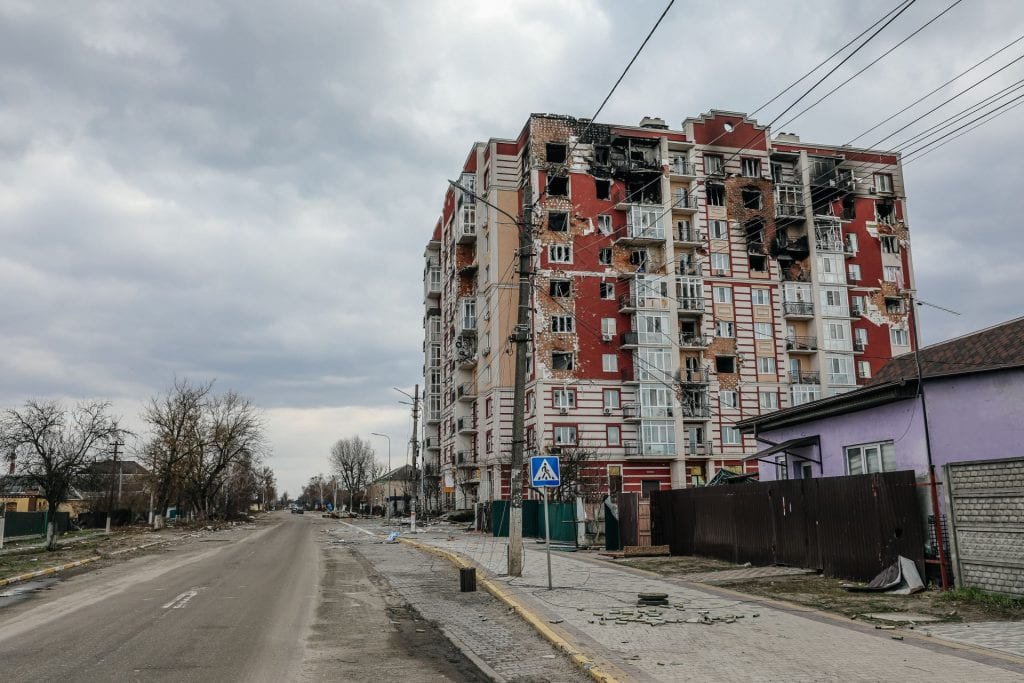
“Talking to the victims is the hardest part of the job,” says Yanina Korniyenko, an investigative journalist from Kyiv. She works for Slidstvo.info, one of the most important investigative media in the country with whom she has uncovered corruption and mafia schemes.
Now, Yanina focuses on documenting war crimes committed by the Russian army. Alongside her team, she is collecting testimonials and other evidence and collaborates with prosecutors who are doing similar work.
“The amount of war crimes that are being committed is overwhelming,” the journalist says, “We hope that sooner than later our work will be used in the courts to help punish the guilty.”
“We have a concrete crime, and a concrete perpetrator”
“Before the war, our job was completely focused on investigating corruption, law enforcement violations, and some criminal cases,” Yanina explains, “But when the invasion happened, we had to change the work completely because we got completely different conditions and realities.”
Her face is serious, solemn even. Her usually positive demeanor is different now, too: she is more restrained, more distant. I met Yanina six years ago when we were both trying out big media collaborations. Back then, Yanina struck me as someone who had the most friendly, the most optimistic attitude I have ever encountered. That is not necessarily how you would imagine an investigative journalist dealing with crime on a daily basis.
But Yanina defies stereotypes. In her mid-twenties, with long blond hair and big blue eyes, she has a natural capacity to make people like her and trust her. She listens well, and she makes people talk: two crucial things for an investigative journalist. Born and raised in Kyiv, she gathered a large pool of contacts across Ukraine, tapping into them for timely investigations.
Before the full-scale invasion, Yanina and her team underwent some in-depth training in OSINT, or open source investigations. The newsroom was expecting some military action from Russia although did not predict how big it would be. The team was trained on how to provide first aid, protect themselves, and understand how different arms were. This helped a bit during the chaos of the first days of the invasion.
“On February 24, we all woke up with explosions in Kyiv,” Yanina proceeds, “We had a morning call with the team and decided to do what we could as fast as possible. We were the first newsroom that started looking for identities of Russian soldiers in Ukraine.”
Their decision was intuitive. The team simply decided to use their OSINT skills and collect data on the troops invading Ukraine. The newsroom split; some remained in Kyiv, and others left for safer areas in Ukraine and abroad. Those in Kyiv managed to travel to northern Ukraine, which was liberated in April; they collected evidence and testimonies of victims. The rest worked remotely, verifying data and connecting with victims online.
Yanina was one of the journalists who left Kyiv. It was a personal decision, driven by her desire to protect her family, especially her elderly grandparents. She returned to Kyiv in May, and does not plan to leave again.
“Through testimonies from Mariupol, I showed that it was a forced deportation”
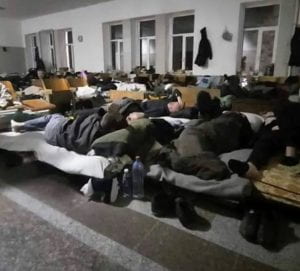
“We work on documenting all possible military crimes taking place in Ukraine and the consequences of Russian attacks, we talk to victims, and we identify the enemy,” Yanina explains, “We believe that every evil has a face, and in this case, it is a face of concrete Russian soldiers who came to kill Ukrainian citizens. That is why if we have an opportunity to identify them, we do it.”
The team focuses on a locality which suffered under Russian occupation and tries to discover what Russian unit was stationed there, sometimes thanks to the lists from the Ukrainian law enforcement agencies. Then, using OSINT and social media, the newsroom looks for each soldier. With their photos in hand, journalists travel back to localities and ask victims to recognize the soldiers.
“This is how we develop a story,” Yanina explains, “We have a concrete crime, and we have a concrete perpetrator of this crime.”
“Another side of the work is to study what is happening in the occupied territories such as forced deportations and kidnappings of civil activists and journalists,” Yanina says, “We talk to people who managed to flee or who are in contact with someone still there. This way, we try to identify conditions, specific locations, and potential legal documents which accompany forced deportation such as migration cards. We try to collect as much evidence that a crime was committed, and that deportations were taking place against people’s will.”
Yanina started this work as an evacuee in Western Ukraine where there were many displaced people from Mariupol. She met and talked to some families, who shared their experience of fleeing the now nearly wiped out city. 90% of the buildings have been damaged or completely destroyed. According the mayor of Mariupol, at least 20,000 residents were killed during the early months of war.
“People barely had a chance to escape as Russians were constantly shooting at the humanitarian corridor. Only few cars managed to survive out of a large column,” Yanina recalls the story.
Locals told her that some Mariupol residents tried to flee the warzone through Russia. So she started looking for them.
The quest turned out to be difficult. The problem was once people were in Russia, it was nearly impossible to reach them, and they had problems leaving the country. Yet Yanina found enough people who fled Mariupol, then Russia, and managed to escape to different European countries. Through her contacts in the EU, she reached out to Ukrainians who agreed to talk on record.
Then, she connected all the testimonies to get the bigger picture.
“People were repeating the same things such as that Russians interrogated children, separated them from families, and made people sign different documents,” Yanina says, “Russians also imprisoned people who did not pass this filtration. Locals could not leave the buildings in which they were based during filtration, and they could not leave the train by which they were deported to Russia. Based on that, we could confirm that it was not a salvation, but a deportation.”
“We have indirect evidence of war crimes. We have photos of immigration cards and booklets given to people who arrived in Russia,” Yanina continues, “For example, Russians want to bring more people to their Far East and Siberia, so they are giving leaflets promising free land to Ukrainians who go there. There are videos and photos of filtration camps where people are located.”
“The amount of testimonies is overwhelming,” she adds, “You can keep on collecting them for years before you get through even half. It is naive to state that all these testimonies are false. But if we are talking about factual evidence, until the city is occupied, we have no access to surveillance cameras. This is the only piece that’s missing because camera footage can show Russian soldiers dragging people out of basements. This final evidence would fill the chain of events.”
“We hope our work will be used in courts to help punish the guilty”
Once people are deported, they are placed under surveillance. Yanina investigates that, too. She discovered that the Russian Orthodox Church was responsible for many of the forcefully deported Ukrainians in Russia.
“When it comes to the Russian Orthodox Church, it does not hide its involvement in the deportations,” journalist says, “They advertise their services online and brag that they found shelter for many people. Shortly, the story is such: the Russian Ministry of the Interior is sending weekly announcements to the Russian Orthodox Church with a number of adults and children who were deported to Russia. The Ministry also provides information on where Ukrainians should be directed. We got evidence that the Russian Orthodox Church is the one relocating the deportees across different monasteries. This shows that Church is collaborating with the occupiers.”
“There is also evidence that the Russian Orthodox Church installed surveillance cameras to monitor Ukrainians: we have letters between church leaders that prove it,” Yanina continues, “I wrote to the church myself to verify it, and they confirmed! They responded that it was true, and that the Russian Orthodox Church finds nothing wrong with this activity.”
Yanina hopes that this and many other discoveries will be used later in the international and domestic courts to bring the responsible to justice.
“We are already cooperating with Ukrainian prosecutors investigating war crimes in Kyiv region,” she says, “Journalists are invited to describe how they obtain certain information and share evidence that is used for criminal investigation. Our newsroom also trained prosecutors on how to identify Russian soldiers. We understand that law enforcement agencies are not always our close friends; very often, they are our opponents, but when we have a common enemy, we find ways to cooperate.”
Yanina, however, has many concerns over how international law works, and whether it can punish the guilty.
Western colleagues such as journalists and NGOs could help facilitate that process by shedding more light on the atrocities, but sometimes, their work is shallow and lacks background information.
“It is good that Western media report on Ukraine to the world, but given that the reporters do not have a lot of experience here and lack contextual knowledge, they cannot analyze the situation in a very profound way,” Yanina explains, “They make overview pieces, but when it comes to documenting war crimes, only few, exceptional investigations touch upon these issues.”
She provides an example of a recent story in The New York Times, which quoted Igor Girkin, a Russian veteran who played a crucial part in illegally annexing Crimea and managing the war in Donbas. When the Times quoted him, his title was “Critic of the Ukrainian government”.
“The NYT did not mention that Girkin is accused of shooting down the Malaysian plane MH17 which killed 298 people in summer of 2014,” Yanina exclaims, “Local journalists do better, more profound research.”
“Access to information will not change Russia”
Yanina is skeptical whether verified news will impact the domestic situation in Russia.
“Our platform has a big percentage of views from Russia, which is weird because our content is only in Ukrainian,” she says, “We only translated a few stories in the beginning where we identified Russian soldiers. Most likely, the views are from their relatives who want to know the fate of their children. However, they do not care much about the rest of what is happening. Even when Russian Internet was free, it did not help them understand that they were living in an authoritarian state with a mad dictator. I do not think it will work now either.”
Yanina herself struggles with the amount of personal stories and pain she collects as a journalist.
“It is difficult to talk to victims because of all the trauma that people went through,” she says, “They experience all of this again when they talk to you, and the memories of deportations and other horrors come back to haunt them. These people expect the interviewer to answer some rhetorical questions, and it is very hard to distance oneself and not to feel for them.”
“Many journalists do become activists, which is an organic process for an invaded country,” she concludes, “Lots of my colleagues have relatives who were deported or killed, and media makers cannot distance themselves from it. It is part of the job.”
Anna Romandash is a Ukrainian freelance journalist and 2022 Research Affiliate at the Mgrublian Center for Human Rights at Claremont McKenna College

